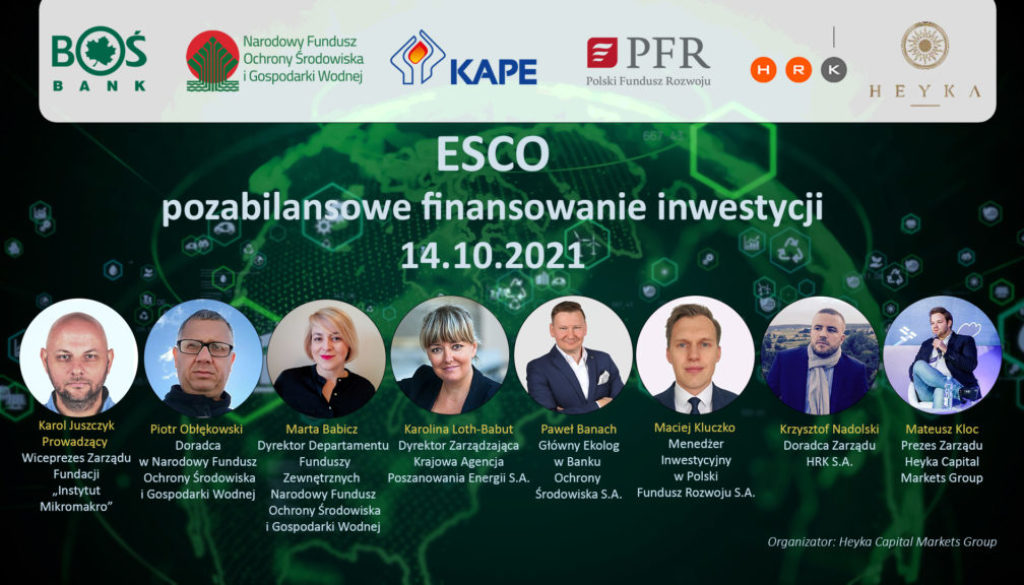Heyka Capital Markets Group organised a conference during “POLECO” fairs in Poznań, about financing projects in ESCO model.
ESCO (Energy Service Company) model – is it an opportunity for the Polish energy sector?
Rising energy prices, reduction of greenhouse gas emissions, costs of the energy transformation related to the EU package “Fit for 55” – these are loudly discussed topics in Poland and in Europe recently. The rapidly recovering economies after the Covid 19 pandemic are increasing the demand for electricity, where at the same time we are in a situation of tightening climate policies that limit the possibility of producing energy from the so-called “Black springs”.
At least 55 percent – this is the goal of reducing greenhouse gas emissions by 2030 set by the European Commission before the member states. One thing is certain – there is no turning back from the increasingly demanding climate policy.
The energy-intensive technologies used so far can be modernized or replaced with those that can fulfil the same task using less electricity. The modernization in question is often capital-intensive infrastructure investments that require enormous investment outlays for which local government units or enterprises are not prepared.
A solution that is widely used in the world for this challenge is the use of the energy efficiency financing model – the so-called ESCO model. In short, it is shifting the burden of financial obligations from the end-user to the ESCO, which derives its profits from the savings generated.
ESCO companies have a very precise business model that generates savings through activities increasing energy efficiency, and some of the money saved returns to them in the form of profit.
This model is officially recognized by the European Union, which defines it as follows:
‘These energy service companies (ESCOs), unlike traditional energy consultants or equipment and technology suppliers, can also finance or arrange financing for operations, and their remuneration is directly linked to the energy savings achieved.
Consequently, ESCOs accept a certain degree of risk of achieving better energy efficiency in the end-user facility and are remunerated based on energy efficiency improvements ”.
This way, the client does not have to invest out of his own pocket and obtains savings that also serve to finance the services of the ESCO.
Thanks to this, each party gains:
1) a customer who achieves significant savings in energy consumption without having to invest out of pocket
2) An ESCO that profits from the savings it generates
3) using end services offered by the client who does not notice the difference compared to the previous ones, but can count on a price reduction
4) and the environment benefits from using less energy.
All of this is managed by a specific Energy Performance Improvement Agreement (EPC) between the ESCO and the client, which authorizes the ESCO to carry out performance activities.
Companies that have been operating in the industry for a long time are able to predict with great accuracy how much savings can be achieved for a given entity with specific activities in order to be able to generate predictable profits.
These profits are not only predictable but also substantial, which is why the ESCO business model is one of the most attractive in circulation by far.
In fact, a large number of efficiency-enhancing measures can be used, technologies are available on the market, but standardized procedures and capital are needed to finance them. This is the biggest challenge we face.
These challenges in Poland are faced by public institutions such as the National Fund for Environmental Protection and Water Management and PFR, which announced in October 2021 the “Renovation Priority Program with a guarantee of EPC + savings”. to support ESCOs in Poland. It is addressed to local government units, communities and housing cooperatives and offers up to 30% of the investment value in the form of subsidies. The program was discussed on October 14, 2021, at a conference during the “Poleco” fair in Poznań, attended by: PFR, KAPE, NFOŚiGW, BOŚ Bank, HRS S.A. During the same conference, the position of the investment fund was represented by Mateusz Kloc – President of the Heyka Capital Markets Group, who expressed interest in this type of investment also on the part of private investors, which can definitely help in popularizing this model in Poland. The fund is currently building a database of ESCO companies and a portfolio of projects and is counting on cooperation with the National Fund for Environmental Protection and Water Management, KAPE or PRF in financing this type of investment.
Another favourable piece of information is the change in legal regulations, namely the amendment to the Act on Efficiency, introducing the possibility of wider use of public-private partnerships in contracts for the improvement of energy efficiency.
The application of the PPP Act will allow the use of various modes in accordance with the Public Procurement Law and at the same time will give more freedom in shaping the relations between the parties to the contract. In order to meet the needs of the ESCO market, the application of regulations not adapted to the specificity of the energy efficiency sector has been excluded.
The obligations of the public entity resulting from contracts concluded with the service provider aimed at improving energy efficiency (ESCO) will not affect the level of public debt and the deficit of the public finance sector if the service provider takes over most of the construction risk and the risk related to maintaining the guaranteed level of energy savings. Thanks to this, indebted Local Government Units will be able to use the ESCO model, regardless of their current debt, which in practice is a common situation. The new rules will apply to contracts concluded as a result of proceedings initiated from January 1, 2022.
The ESCO model is a very promising tool, but without the close cooperation of the public sector, solution and technology providers and private finance providers, it may not develop as fast as we all would like

